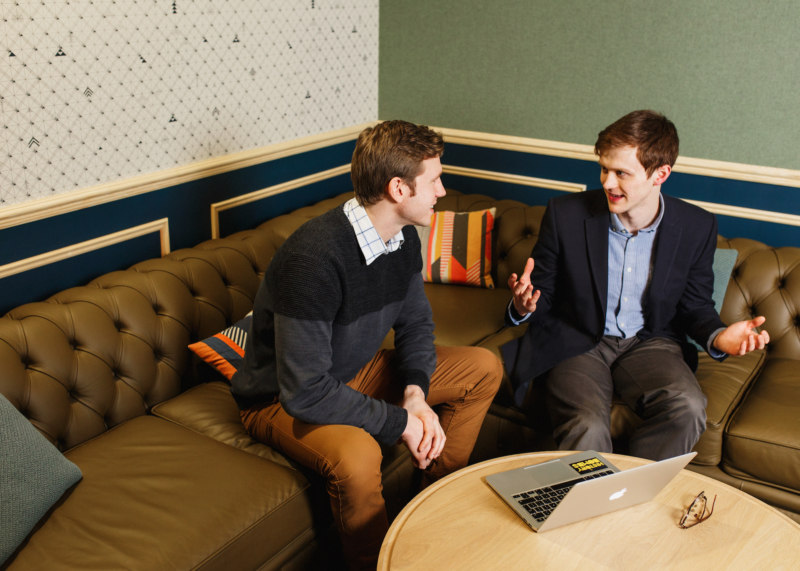The Internet allows people to share their creativity with an audience in a way that was unthinkable in the past. In particular, YouTube has opened new spaces of possibility for entrepreneurs like Chris Hobbs, who started History Bombs, an educational project that brings history to life through workshops, live performances, and YouTube videos.
“I enjoyed history in school, but I found it quite confusing at times,” says Hobbs. “There’s so much going on, and you can get stuck in details and not know how it fits into the bigger picture. I want to give people a clear and concise understanding of the key events in an accessible and engaging way.”
Hobbs, a WeWork Aldgate Tower member, was inspired by sources as diverse as Monty Python and Wes Anderson, and after watching the rise of YouTube during his time at university, he developed the idea of five-minute, single shot videos explaining history in a fast, fun way.
“Our goal is to impassion people of all ages with a real curiosity for history,” he explains. “It’s only through an understanding of history that we can really understand the world as it is today.”

Yet behind the scenes of a YouTube video lurk complex legal issues many creatives don’t anticipate. There’s intellectual property, regulatory matters, and commercial contracts to consider.
This is where Peter Lewin comes in. He’s an associate with Purewal & Partners, a law firm based out of WeWork Moorgate that specializes in digital entertainment like video games, eSports, and, of course, YouTube channels.
“The world hasn’t caught up to the Internet yet,” says Lewin. Therefore, “The laws haven’t caught up to the Internet. It’s hard because every country is different; it’s hard to have a single set of rules everywhere. There’s no YouTube law.”
Hobbs and Lewin connected through WeWork. Purewal & Partners founder Jas Purewal mentioned his firm’s emphasis to a WeWork employee, who remembered it when Hobbs realized a lawyer might be able to help him understand a contract presented by a multi-channel network (MCN).
“Recently, we’ve been approached by a number of MCNs to develop our YouTube channel,” says Hobbs. “When we were getting ready to sign a contract, we needed some legal advice.”
Lewin has always been passionate about digital entertainment, but didn’t think he’d ever get to work in that industry.
“I don’t have any artistic ability or coding ability, so this was my way into an industry that I love in and outside of work,” he says. “Someone out there needs to be reading and writing the fine print.”
Along with their niche focus, Purewal & Partners does business differently: most notably, they rarely charge hourly fees, instead charging by the project.
Their natural partnership has benefitted both members—Lewin is able to help those who create entertainment he consumes, while Hobbs is able to evade time-consuming legalese to further his own passion.
“It’s not like we were trying to explain to them what YouTube was,” says Hobbs. “They knew all about it, and how these contracts work, and where we should be pushing back and asking for more. Peter’s been really helpful in breaking down those contacts and letting us know what we should be fighting for.”
According to Lewin, “Usually going to a lawyer is not exactly everyone’s dream way to spend an afternoon. So if we can make it in any way better by being interested and enthusiastic, that’s a good thing.”
Photo credit: Oscar May





